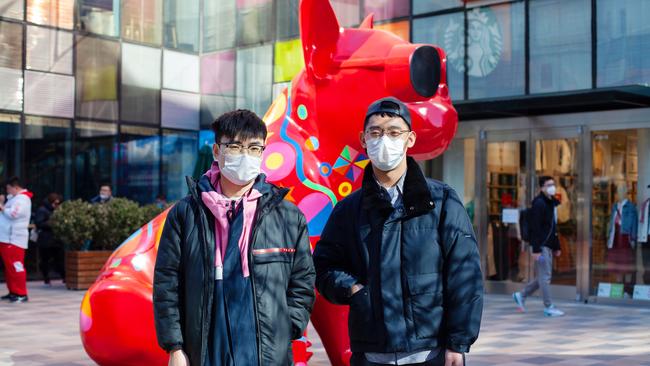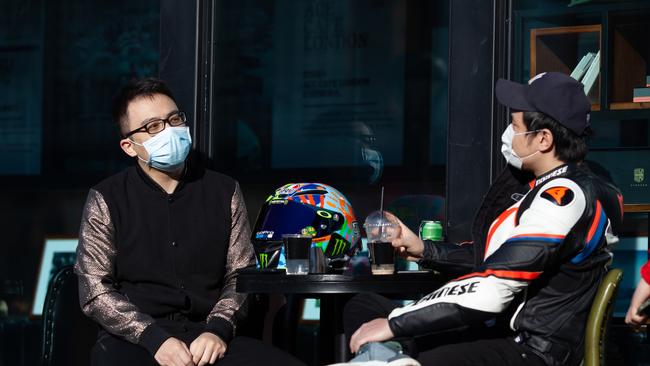Coronavirus: It’s shop and awe for very relieved Chinese consumers
After an almost two-month coronavirus hibernation, cashed-up and very happy Chinese consumers are free to go shopping again.

Some came on bikes, others drove Lamborghinis, and many took the increasingly busy subway. After an almost two-month coronavirus hibernation, cashed-up Chinese consumers were out to spend, just as COVID-19 restrictions were closing stores around the world.
Everywhere in Beijing’s wealthy Sanlitun shopping neighbourhood there were signs to raise the spirits of bruised equity investors, who after decades of Chinese growth have in recent weeks been hit with a spectacular COVID-19 stockmarket dip.
Renminbi was being spent over the weekend by fastidiously groomed men getting their eyebrows sculpted, by young women queuing for the on-trend bubble tea Lelecha, and by young and old — but especially the young — who were out in their droves to buy goods from the world’s most desirable brands.
“We really longed for shopping,” Zhang Mulan, a graduate of Melbourne University who

returned to Beijing to work at an insurance company, said as she and her friend Xiao Yu passed the Beijing flagship store of US tech giant Apple.
The consumer revival followed the reduction in China of the spread of the coronavirus, which is now raging throughout the world, killing thousands and forcing other governments to drastically restrict the movement of their own populations — as President Xi Jinping’s government has done since late January.
That inversion has led to a dramatic disruption of consumer habits in the rest of the world, such as Apple’s decision over the weekend to close all of its almost 500 stores — except for those in mainland China which have only just recently reopened.
“The most effective way to minimise risk of the virus’s transmission is to reduce density and maximise social distance,” Apple chief executive Tim Cook said in a statement that was released as queues lined up outside the company’s Beijing store.
Chinese consumers, whose temperatures are checked when they leave their apartment buildings, when they enter the subway, when they arrive at shopping centres and again at any shop inside, have suddenly become a rare glimmer of good news in the world economy, only weeks after they spooked world financial markets with the worst consumer sentiment measure on record.

Their spending — which is mostly done with WeChat and Alipay payment systems on their smartphones — contributed nearly 60 per cent of growth in the world’s second-biggest economy, according to China’s National Bureau of Statistics.
“We feel safe enough now,” said Wu Yang, a marketing manager at a medical company in Beijing, who was out shopping for shoes in Sanlitun’s Taikoo Li outdoor shopping centre, which houses the flagship stores of many of the world’s best-known multinational brands, including Apple, Nike, Uniqlo and H&M, as well as the French luxury brands so loved by China’s wealthiest.
Dressed in a pair of black and red Nike pumps, Mr Wu — who is still working from his apartment, as a precaution — had just picked up a fresh set of Nikes and two pairs of Converse sneakers.
Wealthy shoppers in the People’s Republic of China appeared to be untroubled by the ongoing furore between their Foreign Ministry and US Secretary of State Mike Pompeo over the origin of the coronavirus, which was first detected in patients in the central Chinese city of Wuhan.
Dozens queued outside the Apple store, despite coronavirus-related shortages of its iPads.
Things were much less busy at the store of its Chinese rival Huawei a few hundred meters away.

“We’re just taking a look around,” said Yan Xiaoliang, who was waiting in the Apple queue with his girlfriend Chen Xiu.
Many in China are reassured by the sustained reduction in new coronavirus cases in the world’s most populous country. Following quarantine measures the World Health Organisation has described as “extraordinary”, daily new cases have fallen from a peak of thousands to as low as single digits in recent days.
China’s government is now most concerned about cases being imported by travellers coming from outside the country.
“You should have confidence in the control measures and have confidence in the government,” said Sun Ao, who was wearing a face mask made by Honeywell, another US-based multinational.
Mr Ao, 36, said he and his girlfriend Xue — who was enjoying the blue sky day and her Starbucks vanilla latte — were now spending in a similar way to before the coronavirus epidemic.

After the outbreak, they had been forced to cancel a planned trip to Hainan, a tropical island and China’s most southern province, and had used up all of their annual holiday leave quarantining from the coronavirus. “Maybe next year,” he said of the trip.
One shopper, Liu Xiaoming — who had bought five bags worth of clothes from the Hong Kong streetwear brand Madness — told The Australian his concerns about the fast spreading virus had been surpassed by his love for the fashion label. “I’m still worried, but this was a special edition,” Mr Liu explained, pointing to a bag full of baseball caps.
On the fringes of the shopping centre, young men and women took pictures of the first flower blossoms of spring, and everywhere friends were catching up in a way they haven’t for months.
Motorbike enthusiasts Ma Wensi and his friends Luo Xi and Liu Xiaoming sat on stools on the terrace of Ace Cafe London, drinking ice coffees after their first ride on their superbikes in two months.
“It feels like meeting with an old friend,” said Ma of getting back on his BMW S1000RR motorbike, parked next to his friend’s gleaming red Ducati Panigale.



